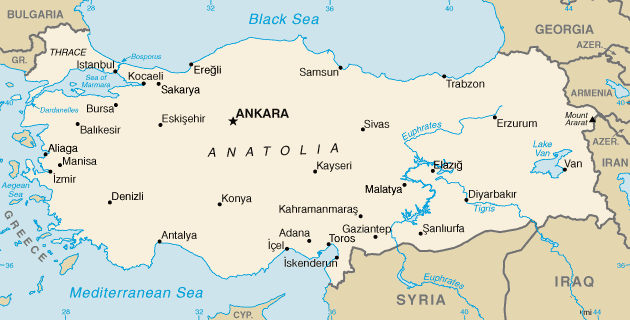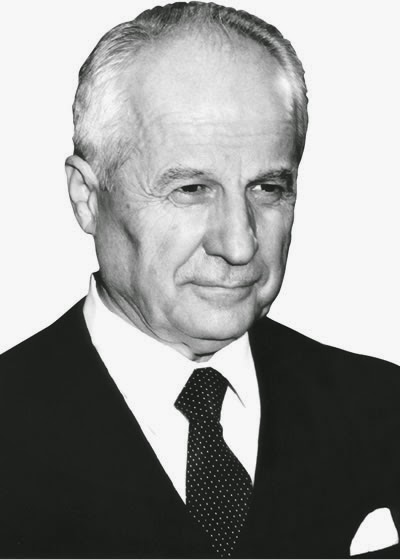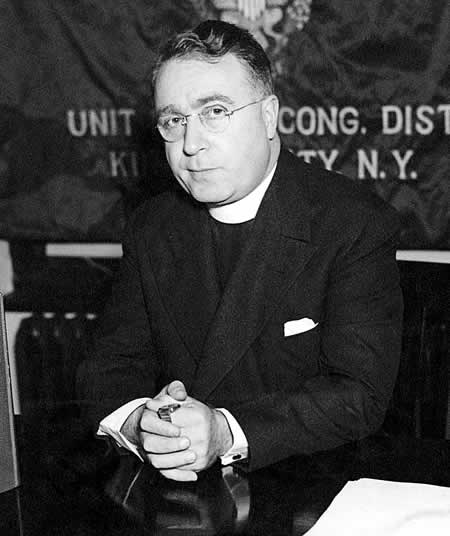 |
| Ukraine |
Since 1991, Ukraine has been an independent state, the sovereignty of which is now recognized by all the countries of the world. Ukraine is one of the biggest European states (603,700 square kilometers). Ukraine has common borders with seven countries (Poland, Slovakia, Hungary, Romania, Moldova, Russia, and Byelorussia), and the Black and Azov Seas are on its southern border.
Ukraine consists of 24 regions (oblast) and the Crimea Autonomous Republic. The capital of Ukraine is Kiev. A Pan-Ukrainian population census in 2001 found the total number of inhabitants at 48,416,000. The majority are city inhabitants, and 32 percent live in the countryside.
Over 100 ethnicities and nationalities are represented in contemporary Ukraine. Among them are Ukrainians, Russians, Belorussians, Moldavians, Crimean Tatars, and Bulgarians. Most of the population of Ukraine belongs to the Orthodox Christian Church.
Striving for national and state independence was a key issue in Ukraine in the 20th century. This aspiration, partly realized during the hard days of 1917–20, remained potent political motivation for Ukrainians living all over the world. The democracy brought by Mikhail Gorbachev’s perestroika inspired ethnic minorities in the Soviet Union to activate national liberation movements.
Revision of the Ukrainian nation historical past, promoted by representatives of the Ukrainian Helsinki Group of human rights activists; a rise in national identity supported and developed by artists, poets, writers, and scientists; and the people’s movement known as "meeting democracy" had created the necessary background for historical action. On July 16, 1990, the Verkhovna Rada (Parliament) of Ukraine, first among the republics of the former Soviet Union, adopted a declaration of state sovereignty of Ukraine.
 |
| Ukraine map |
The next step was a coup that took place in the Soviet Union on August 19–21, 1994, and that resulted in the pronouncement of the Act of State Independence of Ukraine by Verkhovna Rada of Ukraine. Soon afterward the first elections were held for president of independent Ukraine (Leonid Kravchuk won and was president from 1991 to 1994), combined with an all Ukrainian referendum for endorsement of the independence of Ukraine.
Since that time a series of measures aimed at the organization of bodies and institutions necessary for an independent Ukraine have been undertaken. Some acts were compromises with the Russian Federation; because of the deep economic integration of both countries, it was hard to become separated at once.
Issues included the state border between Ukraine and Russia in the Azov Sea; the presence of the Russian navy in Sevastopol in Crimea and the status of that city; and the persoalan of the frontier with Romania around Zmeinyi Island. Some others still remain only partially solved.
On December 7–8, 1991, the presidents of Russia, Ukraine, and Belorussia signed a document denouncing the union treaty of 1922, according to which the Union of Soviet Socialist Republics had been organized. A treaty establishing a Commonwealth of Independent States was signed instead. Since that time, Ukraine has been free to conduct its internal policy.
During 1991–94 a series of democratic reforms were instituted in Ukraine, among which the most important were beginning a constitutional process, the improvement of the multiparty system, the formulation of basic principles of foreign policy and international cooperation, the formulation of a military doctrine, introduction of economic reforms, the elaboration of an ethnic policy, and the creation of relationships with the different churches represented in Ukraine.
The presidential and parliamentary elections of 1994 opened a new phase in the political development of Ukraine. The keystone of the political history of Ukraine at that time was the adoption of a new constitution (June 28, 1996), a long and hard process that repeatedly caused political and parliamentary criss.
It was the beginning of parliamentary and presidential opposition, which led to growing tension during Kuchma’s presidency in relation to the composition of parliament factions and their representation.
The presidential elections of 2004 and the following Orange Revolution opened a new masa in the political history of Ukraine, characterized by general democratization and liberalization of the political process.
Ukrainians dissatisfied with officially announced results of the runoff election between presidential candidate Viktor Yanukovich and leader of the opposition Viktor Yuschenko demonstrated in the principal square of Kiev—the Maidan (Square) of Independence—and for several weeks people from various cities, towns, and villages in Ukraine marched for democracy, for their political rights, and for the possibility to make their political choices freely.
Orange Revolution
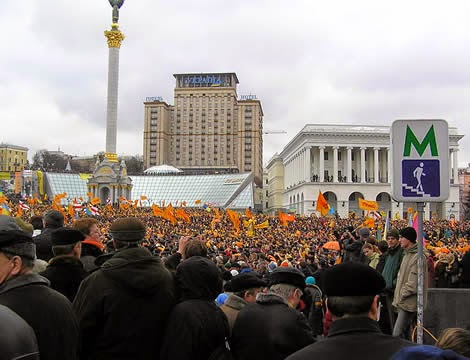 |
| Orange Revolution |
Representatives of different political parties and movements united their efforts in this process, and the Orange Revolution ended in a victory for democracy in Ukraine. A coalition government, with the participation of all "orange" parties and movements, was formed, with Julia Timoshenko as the first woman prime minister in the history of Ukraine.
In local administrations, thousands of former functionaries of different levels have been replaced by "orange" democrats. New priorities in foreign policy, a tendency toward integration with the European Union (EU) and cooperation with the North Atlantic Treaty Organization (NATO) and reorientation of trade relationships have been elaborated.
Nevertheless, as early as the beginning of September 2005, Julia Timoshenko’s government was dismissed, and it became clear that there were serious discrepancies among Orange Revolution leaders and representatives of different orange parties.
Political reform that implies the transition of Ukraine from presidential to parliamentary republic was adopted by the parliament and became a point of serious discussion among "orange" revolutionaries, social democrats, representatives of the Party of Regions, and communists. The ideals of democracy and freedom still remain the essence of the Viktor Yuschenko presidency, as was shown by the first free parliamentary election in March 2006.
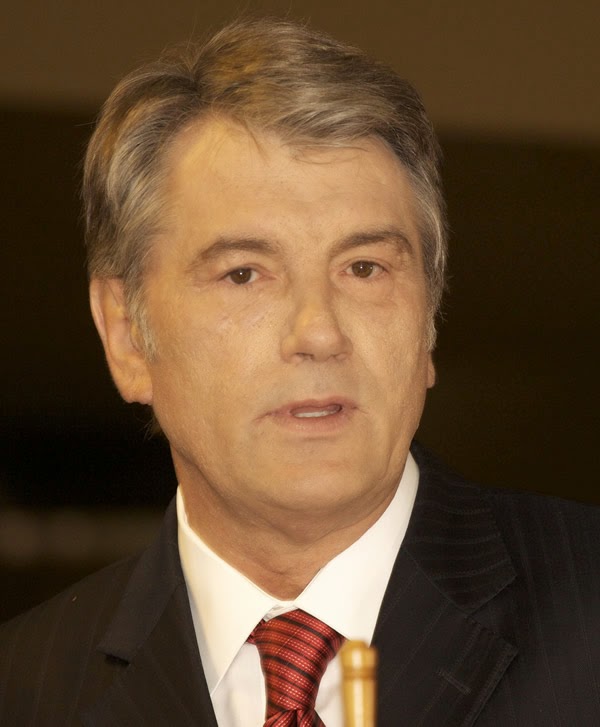 |
| Viktor Yuschenko |
Shortly after its independence, Ukraine faced problems during the transitional period of economic development from planned socialism to free-market forms. The destruction of traditional Soviet resources, marketing, and energetic and macroeconomic networks, along with the extreme difficulty of creating new ones in the European community, and the urgent need for modernization of basic equipment and production techniques, negatively influenced the general state and the prospects of further development of the economy of Ukraine. A so-called shadow economy sprang up and grew rapidly with substantial support from the highest administration of Ukraine, which appeared to be corrupt.
Inflation, accompanied by a decrease in purchasing power, indicated that the standard of living of Ukrainians decreased to a crucial level, creating a need for the state administration to finance a series of social programs. Pension reform, changes in support for families with low income, support for veterans of World War II, and many other social actions were undertaken.
Broad-scale raising of salaries, stipends, and pensions began in 2004 under the government headed by Viktor Yanukovich on the eve of presidential elections. The new president of Ukraine, Viktor Yuschenko, and his ministries consequently instituted a series of social programs aimed at improving the standard of living.
A series of economic reforms, including the introduction of new currency, privatization in agriculture and industry, promotion of national producers and national product exportation, searches for new investments and new sources of power supply abroad, and cooperation with the World Bank, gradually contributed to a general slow growth of the Ukrainian economy after 2000.
The creation of a new macroeconomic network, tending toward integration with the European Union (EU) and the World Trade Organization (WTO), is the principal strategic goal proclaimed by President Yuschenko.
The organization of an independent state of Ukraine led to a new animo in the development of the ideology and culture of the country, connected with the formation of the ideas of national unity and ethnic and national self-identification.
The process of national memory revival, studies of the cultural and historical past of the Ukrainian nation, rediscovering cultural heritage, the revival of the folk culture of national minorities, and the establishment of fruitful connections with the Ukrainian diaspora are key aspects of the cultural development of Ukraine in the new millenium.
One of the sharpest debates in the context of cultural development is the discussion of an official language of Ukraine. It was demonstrated in the presidential election of 2004 and the parliamentary election of 2006 that a strong Russian-speaking opposition still exists in Ukraine.
The activation of religious life in independent Ukraine after the dismantling of a totalitarian ideology brought a series of conflicts, first of all among representatives of different branches of Orthodox Christianity. As stated by the constitution of Ukraine, the nonobligatory character of any religion creates the background necessary for religious pluralism and freedom of people’s consciousness.

